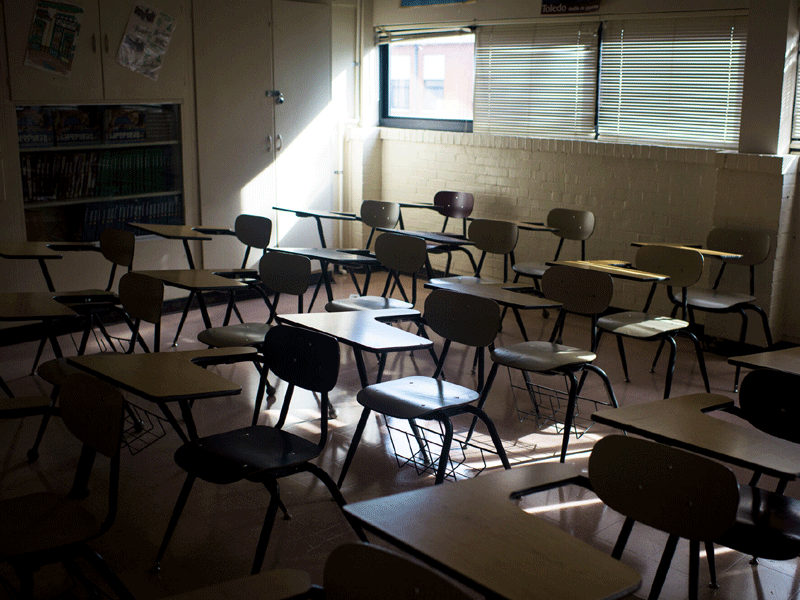Time to do away with corporal punishment at schools

- 222
- 0
The incidents of corporal punishment at schools are on the rise and the recent incidents across the country indicate that the law to this effect needs to be strictly implemented. In the fact, these incidents have created an outrage among the parents and the society at large.
In recent weeks, registration of two private schools has been cancelled on incidents of corporal punishment. In first incident, teacher was fired from job for humiliating a student for speaking Urdu in class. She had painted his face with black ink and asked the class students to laugh at him.
The incident took place in a private English-medium school in North Nazimabad.
Last week, another school's registration was suspended due to corporal punishment of the boy at this school.
According to Directorate of Inspection/Registration of Private Schools Sindh, that a teacher in this school situated in Korangi area of Karachi, had fractured arm of the student as a punishment for not being attentive in the class.
Such incidents can scare the students away from schools which can add to the number of our-of-school children.
As per available date, there are at least 18.7m children who never went to school and do not intend to go either.
Pakistan stands second in the list of countries that have the highest number of out-of-school children. As estimated, 22.8 million children between the age of 5 to 16 years do not go to schools.
According to the latest statistics of the United Nations International Children's Emergency Fund, these out of school children form 44 per cent of the population in this age group, which is an alarming situation.
Now this is appallingly big out-of-school children number which negates the claims by the successive governments to have launched plans aimed at enrolling more and more children in the schools.
To be very specific, not only educating such a big population of the out-of-school children is a challenge for the government, both federal and provincial, but ensuring international standards within the existing education system is seemingly a very difficult task.
Moreover, the creations of jobs creations in the education sector also does not seem an easy task as till now it has not made a real progress.
The irony is that education has never been among the top priorities of successive military and civil governments in the country. Almost every government since the inception of the country, has come up with plans to educate the masses, but those plans were never implemented in letter and spirit, A recent report says that one in every four Pakistani children had never enrolled in a school.
The figures indicate that there is a very slow pace of progress on education participation as well as closing of the gender gap which is increasing with the passage of time.
The situation is almost same in every province. For example, Balochistan province has the lowest participation rate and highest number of out-of-school children.
These statistics reflect the alarming situation of both foundational skills and their significance for productivity and growth. Our economic condition is dire and only a well-educated workforce can ensure an economic growth.
Inaction in bringing children and youth to schools will adversely affect Pakistan's potential for higher productivity and economic progress, and will continue to maintain a large informal labour market and substantial amount of poverty.
As a matter of fact, the corporal punishment at schools may exacerbate the challenges of an already perilous education system by increasing dropouts, and reducing the chances of learning among the students and will affect their productivity on the long term.
The formidable challenges of out-of-school children call for a coordinated approach both at the federal and provincial as well as district level. It also calls for coordination at the programmatic approach and learning from one another's experience.
Inaction at any level can lead to millions of more children dropping-out of schools in the country.
On the other hand, the aspect of corporal punishment should also be addressed by implementing the law to this effect.
It may be recalled here that we have a full-fledged law which has banned the corporal punishment in the schools and according to this law, the schools and teacher found to be resorting to corporal punishment must be punished with imposing penalties.
Along with the implementation of the corporal punishment law, there is a need for change in mindset as in our society and culture, it is permissible for teachers to beat children. So, this mindset must be done away with.
The culture of corporal punishment is pervasive in the country and due to this widespread menace, children are scared of schools.
A number of studies have shown that corporal punishment makes students scare of studies and it has been a cause of concern among the educationists as well but even then, the practice is going on.
Discipline is key to success but it should not be introduced through corporal punishment. There a number of ways to do that and the modern education system has taught a number of methods which are not violent in nature.
Published in The Daily National Courier, February, 07 2023
Like Business on Facebook, follow @DailyNCourier on Twitter to stay informed and join in the conversation.

















































